Harry and Joe Lalor run 100 spring-calving sucklers on 82ha near Ballacolla in Laois. Progeny are brought to beef and the herd runs alongside a dairy calf-to-beef enterprise, a sheep flock and some tillage.
Meeting
At the moment, Harry is fattening 2017-born bulls for slaughter. The group’s general consensus was that Harry should switch from a high-forage TMR diet to an ad-lib concentrate, refreshed twice daily. The animals are currently receiving the equivalent of 8kg of meals daily and were just about finishing the offered feed. However, the diet also contained moderate levels of silage and straw, and the group agreed that there was too much of a fill effect from these.
Weight gains
The group of bulls (18) currently weighs 548kg at 13.5 months and Harry plans to slaughter them under 16 months of age. Harry’s lightest bull is 462kg at 12.4 months – a gain from birth of 1.1kg daily, while his heaviest is 606kg at 14 months of age – having gained 1.32kg from birth, daily. Eight of the 18 bulls have gained 1.7kg, or better, daily since their last weighing in March of this year.
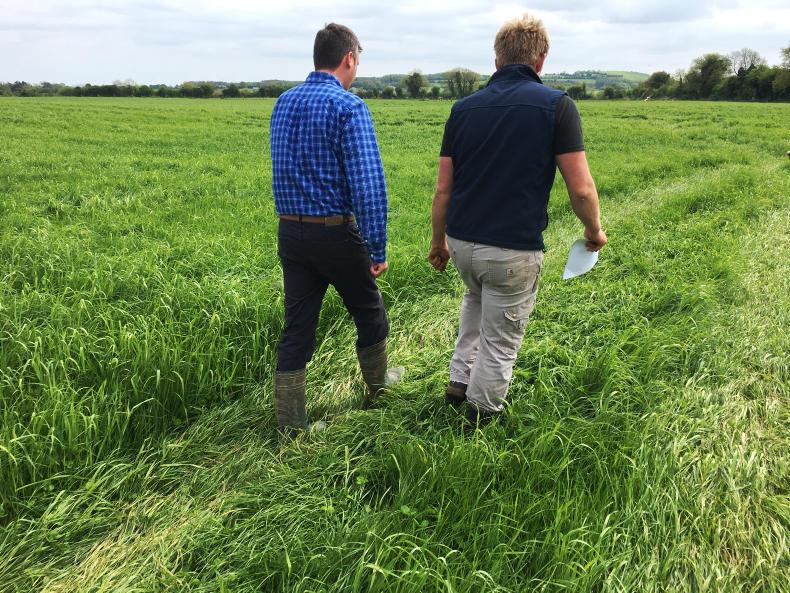
Alan Dillon (left) and Harry Lalor walking through Harry's first-cut silage crop.
To cut or not?
The group also debated one of Harry’s silage fields. Harry said he would be cutting at the end of the month/early-June, even though he was late getting his fertiliser out and would be breaking the so-called ‘two units a day’ rule. However, Connact-based B & T adviser Tom Coll was on hand to point out that provided that sugars were high (>3%), a wilt would further help the case. Harry was given food for thought when the group pointed out that his silage field was already quite heavy and that he should cut sooner, if sugars/nitrates were right, and aim for a good second cut.

Robin Talbot (right) addresses the group.
Robin Talbot
Down the road in Ballacolla, the group then converged on well-known beef producer Robin Talbot’s farm. Robin calves in the autumn and opts for a black Limousin-type cow, crossing with Belgian Blue bulls. Stock bulls work the 220-cow herd and progeny are slaughtered as bulls under 16 months and heifers at 18-20 months. Most of the finishing diet is grown on-farm, with cereals treated with urea-based Maxammon product to lift feeding value and crude protein levels. Target carcase weight for bulls is 400kg.
Wean earlier?
Robin’s calves are still on their dams at 10 months of age and the group argued the point for weaning earlier to save ground and give the bulls a better pick of the grass – they’re currently competing with their mothers. Robin’s argument was that his land was good and he generally didn’t need to house cows as a means of saving ground conditions or reducing grass demand, though like many he did run out of silage late in the spring.
Read more
All BETTER farm material
Meet HArry and Joe Lalor
Grass management guidelines for this week on beef farms
Harry and Joe Lalor run 100 spring-calving sucklers on 82ha near Ballacolla in Laois. Progeny are brought to beef and the herd runs alongside a dairy calf-to-beef enterprise, a sheep flock and some tillage.
Meeting
At the moment, Harry is fattening 2017-born bulls for slaughter. The group’s general consensus was that Harry should switch from a high-forage TMR diet to an ad-lib concentrate, refreshed twice daily. The animals are currently receiving the equivalent of 8kg of meals daily and were just about finishing the offered feed. However, the diet also contained moderate levels of silage and straw, and the group agreed that there was too much of a fill effect from these.
Weight gains
The group of bulls (18) currently weighs 548kg at 13.5 months and Harry plans to slaughter them under 16 months of age. Harry’s lightest bull is 462kg at 12.4 months – a gain from birth of 1.1kg daily, while his heaviest is 606kg at 14 months of age – having gained 1.32kg from birth, daily. Eight of the 18 bulls have gained 1.7kg, or better, daily since their last weighing in March of this year.

Alan Dillon (left) and Harry Lalor walking through Harry's first-cut silage crop.
To cut or not?
The group also debated one of Harry’s silage fields. Harry said he would be cutting at the end of the month/early-June, even though he was late getting his fertiliser out and would be breaking the so-called ‘two units a day’ rule. However, Connact-based B & T adviser Tom Coll was on hand to point out that provided that sugars were high (>3%), a wilt would further help the case. Harry was given food for thought when the group pointed out that his silage field was already quite heavy and that he should cut sooner, if sugars/nitrates were right, and aim for a good second cut.

Robin Talbot (right) addresses the group.
Robin Talbot
Down the road in Ballacolla, the group then converged on well-known beef producer Robin Talbot’s farm. Robin calves in the autumn and opts for a black Limousin-type cow, crossing with Belgian Blue bulls. Stock bulls work the 220-cow herd and progeny are slaughtered as bulls under 16 months and heifers at 18-20 months. Most of the finishing diet is grown on-farm, with cereals treated with urea-based Maxammon product to lift feeding value and crude protein levels. Target carcase weight for bulls is 400kg.
Wean earlier?
Robin’s calves are still on their dams at 10 months of age and the group argued the point for weaning earlier to save ground and give the bulls a better pick of the grass – they’re currently competing with their mothers. Robin’s argument was that his land was good and he generally didn’t need to house cows as a means of saving ground conditions or reducing grass demand, though like many he did run out of silage late in the spring.
Read more
All BETTER farm material
Meet HArry and Joe Lalor
Grass management guidelines for this week on beef farms














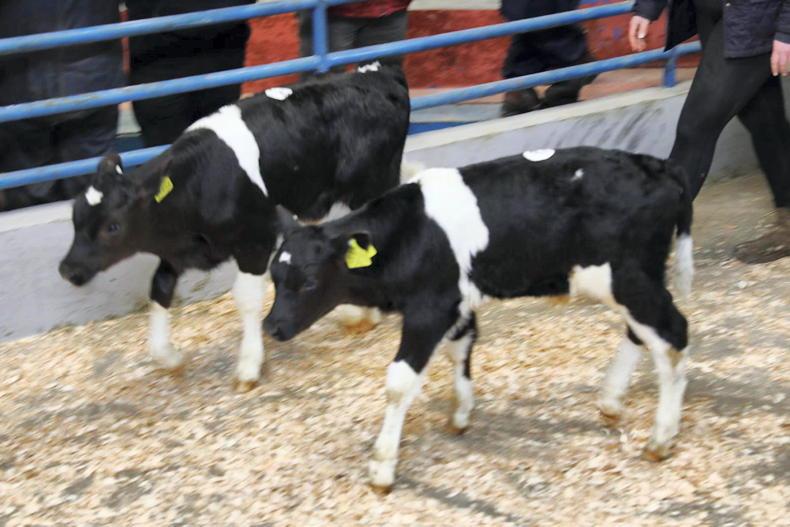

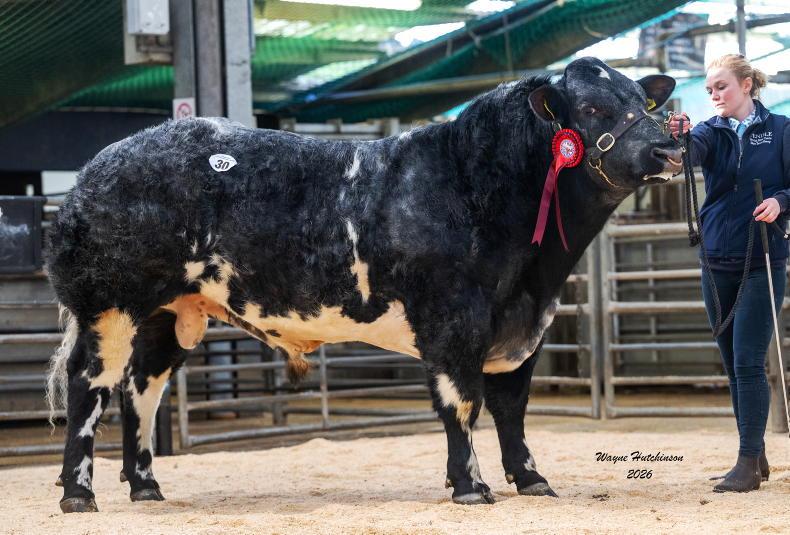
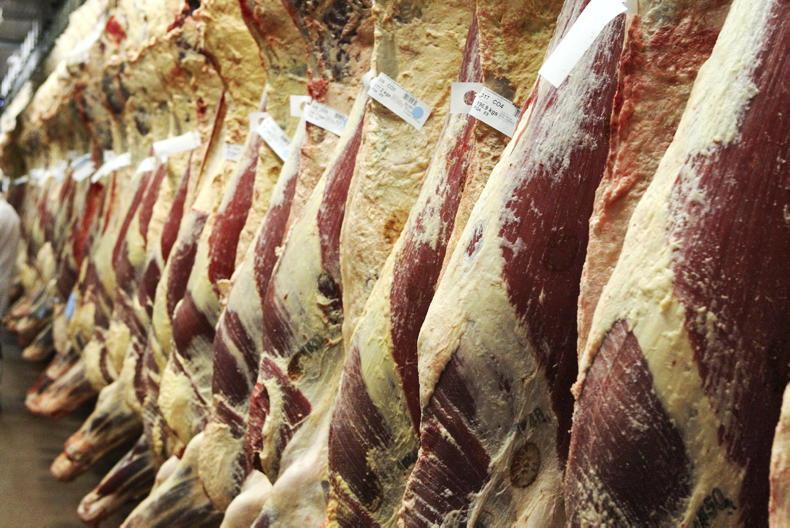
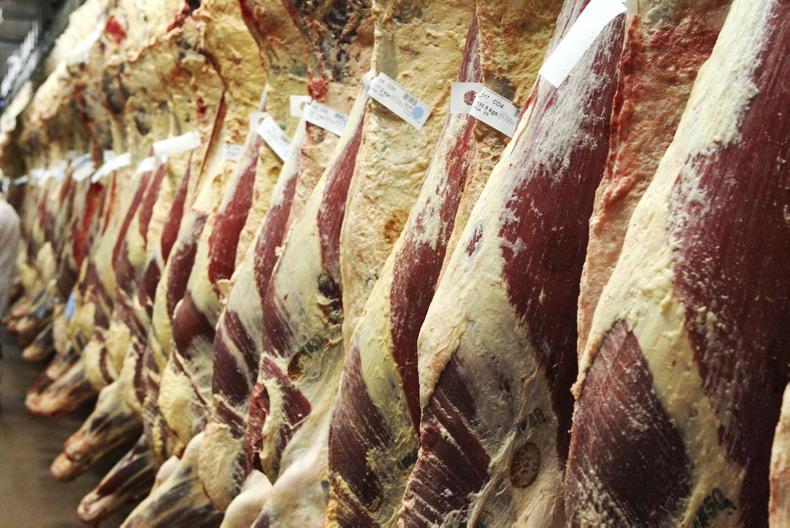
SHARING OPTIONS